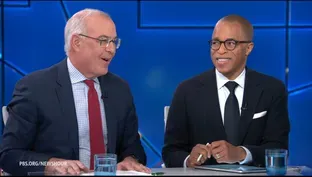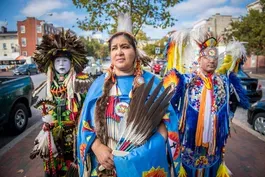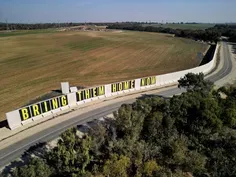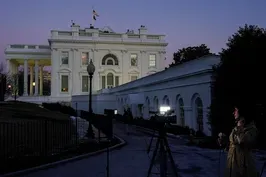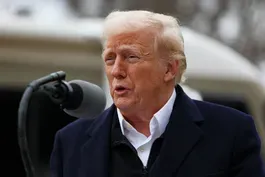
Auschwitz survivor's family searches for answers
Clip: 1/24/2025 | 12m 3sVideo has Closed Captions
Holocaust survivor's family searches for answers while retracing her steps at Auschwitz
Monday marks the 80th anniversary of the liberation of the Auschwitz-Birkenau extermination camp. One of the youngest survivors was an eight-year-old Polish girl named Rutka. She moved to Canada after the war and took the name Rachel Hyams. Decades later, she died by suicide. Rachel’s daughter has been retracing her mother’s steps and allowed Malcolm Brabant to come along on the emotional journey.
Major corporate funding for the PBS News Hour is provided by BDO, BNSF, Consumer Cellular, American Cruise Lines, and Raymond James. Funding for the PBS NewsHour Weekend is provided by...

Auschwitz survivor's family searches for answers
Clip: 1/24/2025 | 12m 3sVideo has Closed Captions
Monday marks the 80th anniversary of the liberation of the Auschwitz-Birkenau extermination camp. One of the youngest survivors was an eight-year-old Polish girl named Rutka. She moved to Canada after the war and took the name Rachel Hyams. Decades later, she died by suicide. Rachel’s daughter has been retracing her mother’s steps and allowed Malcolm Brabant to come along on the emotional journey.
How to Watch PBS News Hour
PBS News Hour is available to stream on pbs.org and the free PBS App, available on iPhone, Apple TV, Android TV, Android smartphones, Amazon Fire TV, Amazon Fire Tablet, Roku, Samsung Smart TV, and Vizio.
Providing Support for PBS.org
Learn Moreabout PBS online sponsorshipAMNA NAWAZ: This coming Monday marks the 80th anniversary of the liberation of the Auschwitz-Birkenau extermination camp.
An estimated 1,100,000 people, mainly Jews, were murdered there during the Holocaust.
One of the youngest survivors was an 8-year-old polish girl named Rutka.
She moved to Canada after the war and took the name Rachel Hyams.
Decades later, she died by suicide.
And now Rachel's daughter has been retracing her mother's steps and allowed special correspondent Malcolm Brabant to come along on the emotional journey.
AUDREY HYAMS ROMOFF, Daughter of Auschwitz Survivor: Oh, my God.
LINDSAY ROMOFF, Granddaughter of Auschwitz Survivor: Take a deep breath.
AUDREY HYAMS ROMOFF: This place has dominated my whole life.
This place destroyed my family.
And the echoes of this place continue to destroy my family.
MALCOLM BRABANT: Audrey Hyams Romoff has spent a lifetime resisting the compulsion to come here.
AUDREY HYAMS ROMOFF: That station looks completely intact, no different than it did over 80 years ago.
MALCOLM BRABANT: Now supported by her daughter Lindsay, Audrey has traveled from Toronto to try to find answers to two unresolved family mysteries.
Why was her grandfather Aron killed during a fight in a cattle car on the way to Auschwitz-Birkenau?
But, more importantly, what drove her mother, Rachel, to suicide 63 three years after she and her mother, Regina (ph), survived this, the worst of all the Nazi extermination camps?
Rachel was just eight years old when she entered the gate of death.
Most people transported here from across occupied Europe went straight to the gas chambers.
But Rachel and her mother did not, as she told the Shoah Foundation 28 years ago.
RACHEL HYAMS, Auschwitz Survivor: I have this memory, and it's troublesome.
I see a door that is oval on top and straight on the bottom.
In my own mind, is that a door to a crematorium?
I know that our clothes are being taken away.
I knew that women were having their heads shaved.
MALCOLM BRABANT: This Russian film shot a week after the death camp's liberation shows the child survivors.
Among them somewhere is 80-year-old Rachel.
RACHEL HYAMS: It's been a journey.
It's not over.
I'm still grappling.
And the issue for me is, what do you do with the trauma?
We're all prisoners of our past.
MALCOLM BRABANT: Rachel grew up to be a nurse in Canada.
She married a doctor, Brahm (ph), and became more prosperous, dressing in bright colors as a counterpoint to her dark past, and she had children and grandchildren.
But, in 2008 in Montreal during a Jewish holiday, more than 60 years after Rachel escaped the gas chambers, the Nazis finally triumphed.
Seen here a decade earlier with mother, Regina, and husband, Brahm, Rachel was mentally unraveling.
AUDREY HYAMS ROMOFF: My father said, in a quiet voice, he said: "Your mother doesn't want to be here anymore."
And when I heard that, I didn't take it seriously.
And I didn't take it seriously because my mother had made these grand pronouncements all my life.
MALCOLM BRABANT: But later, with tragic symmetry, Rachel shut herself in the garage and started the car.
Her husband, Brahm, was also asphyxiated, possibly accidentally.
Their deaths remain a mystery.
There was no suicide note.
RACHEL HYAMS: I'm trying to deal with survivor guilt.
AUDREY HYAMS ROMOFF: People who have made this type of decision are really at peace, because they know that they're taking control and they're not going to be in pain.
And that's really hard for me to live with.
What should I have done that I didn't do?
So that really is much more present for me than the manner in which she decided to take her life.
MALCOLM BRABANT: The search for answers gains traction in the Archives of Tomaszow Mazowiecki south of Warsaw, where the Nazis crowned Audrey's family into a ghetto, along with 15,000 other Jews.
Historian Justyna Biernat has won accolades for revealing Tomaszow's dark past.
Only five of the town's Jewish children survived the Holocaust.
One of them was Rachel.
JUSTYNA BIERNAT, Historian: So, Aron with his family and your grandpa with your grand-uncle with -- so there were a few children, I mean, Abraham, Isaac, Hinda (ph) and Rutka.
And they were all together in one flat in the ghetto.
MALCOLM BRABANT: Builders were at work erasing the last traces of the block's former Jewish occupants, including Audrey's relatives, who spent more than two years here being terrorized and starved by the Nazis.
JUSTYNA BIERNAT: We know the most Grynszpan family were resettled here, and it was about 16 people from the Grynszpan family, and I think that about eight or nine in one flat.
LINDSAY ROMOFF: To know how many of them were sort of just packed in here is hard to wrap your head around.
AUDREY HYAMS ROMOFF: I talked about how I didn't think that my mother and my grandmother would want us to do this trip.
And I don't think they ever could have imagined that I'd be standing in this place, where they were.
And it's hard.
I just -- I don't know.
I feel the ghosts.
MALCOLM BRABANT: Nearby St. Wenceslas Church was built after the war to exercise ghosts.
It replaced a little wooden church where, in late fall 1942, over two days, 14,000 Jews from the ghetto were selected to be exterminated.
Scores were also massacred here.
Their bodies littered the churchyard.
Extraordinarily, wooden St. Wenceslas survived the war and has been moved a short distance away.
LINDSAY ROMOFF: I don't think I want to absorb the energy of this place because it's so dark.
And I carry a lot with me.
I don't need to carry this.
MALCOLM BRABANT: This church is born witness to one of the most evil things that happened during the Holocaust in Tomaszow Mazowiecki.
A Nazi officer sat in front of this building acting like a Roman emperor, giving the thumbs down to those Jews who were sent to the line of death and they were transported to Treblinka, a death camp, and gassed.
To others who were more privileged, he gave the thumbs up and they could survive, and those people included Audrey's family, because the Germans had a use for Audrey's grandfather, Aron Grynszpan.
JUSTYNA BIERNAT: We have got Aron Grynszpan here in the Jewish police.
MALCOLM BRABANT: And this is the wages ledger that proves Grynszpan was a low-ranking officer in the ghetto.
Across Poland, Jewish elders were ordered by the Germans to establish ghetto police forces to make them accessories to Nazi war crimes.
In Tomaszow, sons of good families were recruited in a vain attempt to mitigate the Germans' actions.
Grynszpan signed up on the same day as his best friend, Makal Grossman (ph).
JUSTYNA BIERNAT: The Germans knew what they're planning, right, that the ghetto will be liquidating.
And they knew that they will need hands for doing this.
MALCOLM BRABANT: As the liquidation of the Tomaszow ghetto approached, the Jewish police were given a pay raise.
JUSTYNA BIERNAT: Everyone needs to eat -- to eat and to be safe.
So perhaps money, it was low money, but it was the way to survive.
MALCOLM BRABANT: In Tomaszow's book of remembrance, Aron Grynszpan's friend, Makal Grossman, described how, on those two terrible days in 1942, Nazis mercilessly beat Jewish policemen as they shepherded their fellow Jews to the cattle cars.
One policeman forced to participate in the deportations was Henry Bierzynski.
HENRY BIERZYNSKI, Former Jewish Ghetto Policeman: This was part of the work, you see, of the police that they didn't like, you see, that we had to cooperate with the Germans.
They used us, under the threat of shooting us.
And we did have to do it, you see?
MALCOLM BRABANT: Bierzynski's rare account of life as a ghetto policeman is contained in "The Ghost Tattoo" written by his son Australian doctor Tony Bernard.
TONY BERNARD, Author, "The Ghost Tattoo": In terms of you and me, be absolutely clear.
If your grandfather had not been a ghetto policeman, you would not be here and I wouldn't be here, no two ways about it.
There were stacks of young, fit, healthy people who all went to Treblinka on those trains and didn't survive.
You really had to have this get-out-of-jail card.
RACHEL HYAMS: The question of our survival is something that I grapple with, and I will for the rest of my day.
MALCOLM BRABANT: Audrey and Lindsay are retracing Rachel's steps into Crematorium 3 in the fall of 1944.
AUDREY HYAMS ROMOFF: There was an incident that my mother could never explain when she was here, that they gathered all the children, and they had them undressed and they brought them into the gas chamber and then nothing happened.
And after a little while, they took them back out and brought them back to the barracks.
MALCOLM BRABANT: One possible explanation is that the children were saved by Hitler's deputy Heinrich Himmler's order that gas chambers cease operations.
In a futile attempt to cover up the Nazis war crimes before abandoning Auschwitz-Birkenau, the Germans blew up Crematorium 3.
Only Crematorium 1 remains intact.
AUDREY HYAMS ROMOFF: Oh, God.
The ovens were hard.
Mostly, all I thought about was children.
You know my mother was a child survivor, and I thought, how many children were in here that didn't just survive like my mother did?
It's strange.
The gas chamber or whatever, I mean, it's just a space, and you know that the stains on the walls, what the history of that is.
But to turn the corner and see where they burned the bodies, that's been horrible.
MALCOLM BRABANT: Eighty years on, a Third World War seems closer than ever.
LINDSAY ROMOFF: With the right set of circumstances, there's a lot of hate in this world, and people are capable of doing horrible things, and I don't think that we have passed that point in our in our humanity that this is an impossibility.
AUDREY HYAMS ROMOFF: We're here to honor them, and if they can see us, to say we came back here.
Don't be mad at me.
We remember you.
We remember everything that was lost here.
And we continue to walk with the grief beside us, just like my mother walked with the grief beside her.
MALCOLM BRABANT: Audrey's and Lindsay's pilgrimage didn't yield the definitive answers they were seeking, but they left with greater understanding.
AUDREY HYAMS ROMOFF: It's painful to be here.
It's good that I came, but I never want to come back.
MALCOLM BRABANT: For the "PBS News Hour," I'm Malcolm Brabant in Auschwitz-Birkenau.
Brooks and Capehart on the busy first week for Trump
Video has Closed Captions
Brooks and Capehart on the busy first week of the new Trump administration (10m 53s)
Lumbee Tribe gets Trump endorsement for federal recognition
Video has Closed Captions
North Carolina's Lumbee Tribe gets Trump's endorsement for federal recognition (5m 16s)
News Wrap: Hamas names 4 hostages it intends to release next
Video has Closed Captions
News Wrap: Hamas names 4 Israeli hostages it intends to release next (5m 58s)
State Department suspends foreign aid for 3 months
Video has Closed Captions
State Department suspends nearly all U.S. foreign aid for 3 months (2m 42s)
Trump considers major changes to federal disaster response
Video has Closed Captions
Trump questions need for FEMA and says states should 'take care of disasters' (8m 54s)
Women's 3x3 basketball league builds on WNBA's surge
Video has Closed Captions
Women's 3x3 basketball league 'Unrivaled' builds on WNBA's surge (5m 22s)
Providing Support for PBS.org
Learn Moreabout PBS online sponsorshipMajor corporate funding for the PBS News Hour is provided by BDO, BNSF, Consumer Cellular, American Cruise Lines, and Raymond James. Funding for the PBS NewsHour Weekend is provided by...

